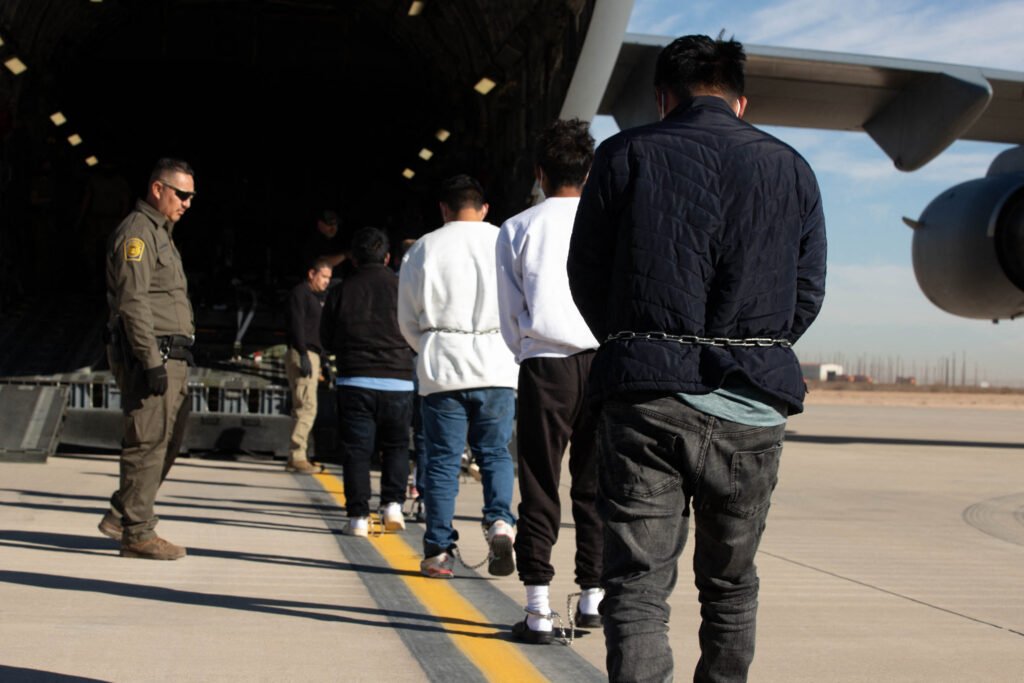Uganda has become the latest African nation to strike a controversial deal to accept deportees from the United States. The decision marks Uganda as the fourth African country to sign onto the Trump administration’s expanding “third-country deportee” initiative, a program that sends migrants to countries where they have no prior connections.
Meanwhile, a report by the Scalabrini Institute for Human Mobility in Africa shows that Uganda is already home to about 1.7 million refugees, one of the largest such populations in the world. These refugees are mostly from South Sudan, Sudan, and the Democratic Republic of Congo.
Before Uganda, Rwanda, Eswatini, and South Sudan had already opened their doors under similar arrangements. In mid-August, Rwanda accepted seven deportees, three of whom asked to return to their home countries while four chose to remain in Rwanda. Eswatini received five deportees in July, a move that sparked lawsuits from civil society groups who argued the deal was unconstitutional. South Sudan admitted eight deportees earlier this year, while beyond Africa, El Salvador and Panama have each struck agreements with Washington, some in exchange for direct financial payments.
Before now, officials in Kampala denied the existence of such an arrangement. Uganda’s state minister for foreign affairs, Henry Okello Oryem, claimed that no deal had been signed, though he admitted that discussions touched on “visas, tariffs, sanctions, and related matters.” At the time, he also raised concerns about criminal elements among deportees, asking: “We’re dealing with cartels: individuals who are not welcome in their own nations. How can we incorporate them into local communities in Uganda?”
But by August, Uganda’s Ministry of Foreign Affairs confirmed the deal. Permanent Secretary Bagiire Vincent Waiswa described it as a “temporary arrangement” under which Uganda would receive individuals facing deportation from the United States who refuse to return to their home countries. Waiswa stressed that operational details were still being negotiated, noting a preference to take in deportees of African nationality.
Critics, however, see little upside for Kampala. Ugandan journalist and international relations researcher Raymond Mujuni warned that Uganda’s already stretched resources could buckle under further pressure.
“It’s an agreement that alleviates the strain on the US but offers little benefit to Uganda,” says Mujuni. “Uganda currently hosts one of the largest refugee populations globally, and this only adds more pressure on its limited resources. There’s much that is lacking in international law with regard to this agreement.”
The deal announcement comes at a delicate moment in Uganda’s trade relations with Washington. In 2023, the Biden administration removed Uganda from the African Growth and Opportunity Act (AGOA), ending its preferential duty-free access to US markets. The Trump administration followed up with a 15 percent tariff on Ugandan exports, hitting coffee, vanilla, cocoa, and petroleum products especially hard.
Coffee alone accounts for the bulk of Uganda’s exports to the U.S., putting it in direct competition with established suppliers like Colombia. For many analysts, the deportee deal looks less like a migration policy and more like a bargaining chip in a broader trade negotiation.
Human rights lawyers have described the deals as exploitative.
“The proposed deal runs afoul of international law,” said Ugandan lawyer Nicholas Opiyo. “We are sacrificing human beings for political gain; in this case, because Uganda wants to stay in the good graces of the United States.” His concerns echo fears that the U.S. government is targeting countries with weaker human rights protections, effectively turning Africa into a “dumping ground” for deportees unwanted elsewhere.
Melusi Simelane from the Southern Africa Litigation Centre has also been particularly vocal against this move, describing US actions as exploitative and treating the continent as a dumping ground. Simelane argued that Washington specifically targets countries with weak human rights protections, making them more likely to accept such agreements.
The controversy touches on practical challenges, too. Opposition lawmaker Muwada Nkunyingi accused President Yoweri Museveni’s government of rushing into the deal ahead of the 2026 elections to improve its reputation abroad.
Some analysts believe the deal lessens pressure on the Ugandan president and could improve trade opportunities. In a statement by Marlon Agaba, executive director of the Anti-Corruption Coalition Uganda, “The Trump administration is about deals, about deal-making, and any strongman would welcome that.”
Civil society activists similarly worry that the lack of parliamentary oversight leaves the agreement on shaky constitutional ground. Unlike El Salvador or Panama, which secured millions of dollars in compensation, Uganda has yet to announce any concrete benefit from the deal beyond vague suggestions of future trade concessions.
For the Trump administration, the deportee initiative is a pragmatic way to ease domestic political pressures. For Museveni, it may be a calculated gamble: tolerate criticism at home in exchange for potential trade relief and continued goodwill in Washington.
But as Uganda shoulders both one of the world’s largest refugee populations and now an influx of deportees, questions remain about whether its already stretched systems and its political will can bear the load.













